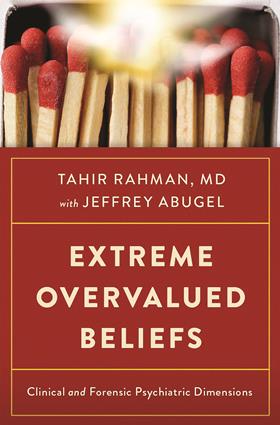Extreme Overvalued Beliefs: Clinical and Forensic Psychiatric Dimensions
Tahir Rahman, MD with Jeffrey Abugel
£25.99, Oxford University Press
★★★★✩
In this short but tightly written book, Dr Tahir Rahman and co-author Jeffrey Abugel introduce the concept of extreme overvalued beliefs (EOBs), a critical framework for understanding the psychological underpinnings of targeted violence. EOBs are shared, emotionally charged beliefs that individuals hold with intense commitment, often leading to violent actions in their service. These beliefs are culturally reinforced, distinguishing them from delusions or obsessions.
The introduction of EOBs presents a valuable instrument for distinguishing between delusional and ideologically motivated violence, thereby significantly enhancing forensic assessments. This novel perspective shifts the emphasis from traditional psychiatric diagnoses to a more culturally and emotionally nuanced comprehension of targeted violence.
The authors argue that many high-profile violent events – such as the JFK assassination, the Oklahoma City bombing, and the 6 January US Capitol attack – are better understood through the lens of EOBs rather than traditional psychiatric diagnoses.

The book is enriched with vivid case studies that illustrate the real-world applications of EOB theory. These provide a window into the minds of individuals who have committed acts of targeted violence, offering insights into their motivations and the cultural contexts that support their beliefs.
Rahman and Abugel’s work offers practical guidance for both mental health and legal professionals in identifying and assessing EOBs. This framework is essential for developing effective intervention strategies and for providing a deeper understanding of the dynamics of mass violence in contemporary society.
EOBs represent a critical development in the field of forensic psychiatry. By differentiating between psychotic delusions and culturally reinforced beliefs, Rahman and Abugel provide valuable tools for both mental health professionals and legal authorities. Their work underscores the importance of considering the broader cultural and emotional contexts in assessing violent behaviours, paving the way for more nuanced and effective approaches to prevention and intervention.
The book successfully bridges the disciplines of psychiatry, law and social sciences, rendering it pertinent to a diverse audience concerned with violence prevention.
The concept of EOBs holds promise for enhancing the understanding and management of targeted violence. However, further research and careful application are necessary to ensure its effectiveness and prevent potential misuse.
Heledd Wyn is a partner at Rothley Law, Bristol































No comments yet